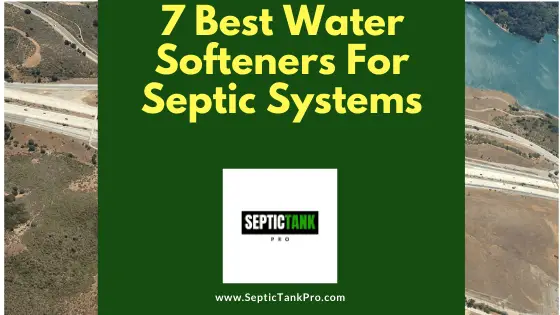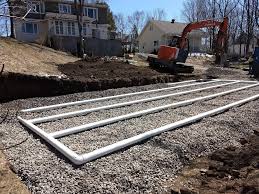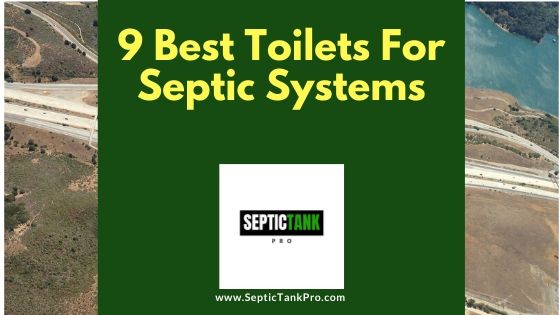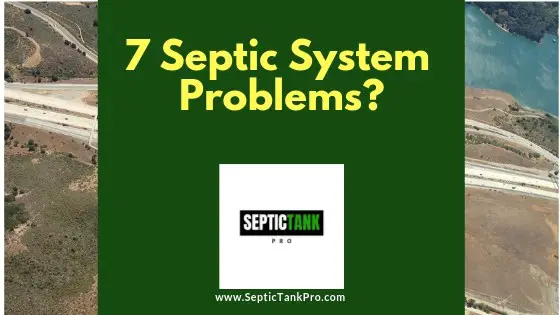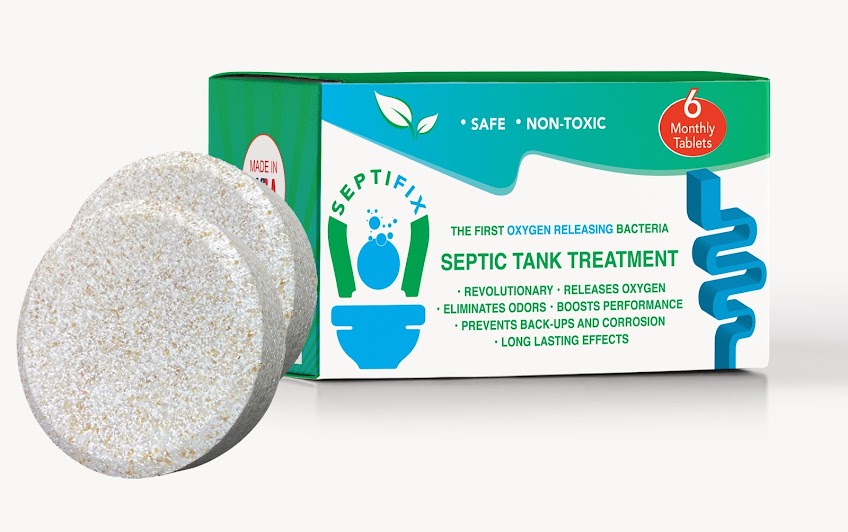Best Water Softeners For Septic Tanks
A water softener (a.k.a. water conditioner) system is the most effective type of whole house filtration system to remove calcium and magnesium from water – minerals that make water “hard.” While hard water and the responsible minerals are not, in themselves, unhealthy, they do cause problems for people who bathe in and wash with it, to the plumbing, and a number of appliances. If the water that you get in your property is moderately hard (approximately 3.5 Grains per Gallon or GPG) or higher, then you may want to consider the benefits of a water softener. Conditioning of “softening” your water potentially bring considerable cost savings as well as the prevention of problems caused by hard water. However, if your property is one of the millions relying on on-site dedicated septic systems, you will need to take your sewage treatment facility into consideration in making your choice of water softener.
What water softener is best for septic systems? There are two main types of water softeners: demand-initiated regeneration (DIR) and timer-based systems. A DIR water softener measures your water usage and average water hardness and determine when to regenerate. Timer-based systems, on the other hand, operates on a predetermined timeframe that may or may not be accurate. This is why DIR water softeners are considered more efficient as these conserve water, energy, and salt use. DIR water softeners are considered as the best systems for homes with septic tanks for several reasons: First, the amount of water discharged by a DIR system is equivalent to a load of laundry, meaning it is easily within the thresholds of a septic system’s capacity. Second, because a DIR softener only regenerates when necessary, the system is not overloaded with backwash of softener. Third, the discharged solution of a DIR system has a greater ratio of calcium and magnesium ions to sodium. High amounts of calcium and magnesium actually help improve the absorption time of treated wastewater by the drainfield. Finally, water softeners also help homeowners consume up to 50% less soap and reduce overall water usage. If you own a septic system, you would already know that conservative water usage goes a long way in keeping a septic system healthy for a long time.
If you already own a water filter or you only need a water softener to remove scale build-up and the staining properties from hard water that you get, keep on reading for our recommendations of the best water softeners and salt-free water conditioners. If you look closely at each brand/model, you will find that the different manufacturers offer the systems in various sizes and with different options. It is recommended that you submit your water for a test so as to determine which filtration system will deliver the best results.
#1 Tier 1 Eco Series Salt-free Water Softener
Tier1 Eco Series Whole House Systems deliver clean, great-tasting water without while reducing the build-up of limescale in your plumbing system. Its system components are customizable, ensuring the filtration meets every household’s specific needs. Salt-free systems operate without the backwash phase of the regeneration cycle, unlike traditional water softeners. Tier 1’s quality filtration process ensures that you avoid costly damage to your home’s plumbing system and to your appliances, as well. This Eco Series Whole House System is designed for homes with 1 to 3 bathrooms.
PRO: This water filtration system from Tier 1 is loved for its ease of use. There are no complicated control valves to work on, no backwash waste cycles to deal with, no expensive salt refills required, and power is not required. All one needs to do is install it and it will get right to work,
CON: Depending on the type of water you have in your area, you may need to change the replacement filters more frequently than others.
#2 SpringWell Futuresoft Salt-free Water Softener
The cutting edge SpringWell FutureSoft salt-free water is an environmentally-friendly alternative to salt-based water softening and elimination of scale build-up. It is built in premium stainless steel and is a chemical-free, maintenance-free solution to hard water. SpringWell Futuresoft is self-adjusting, acts accordingly to the hardness of water present. With SpringWell Futuresoft, you can now cook and mix beverages with fresh-tasting water. What’s more, it extends the life of your appliances.
PRO: Users love the product because it is guaranteed environment-friendly and efficient as it uses no salt or electricity. The absence of chemical taste in tap water is noticeable, leaving many users truly satisfied with the product. Easy Installation Kit included.
CON: Though effective in softening water, it may still leave tiny mineral deposits on surfaces. However, when compared to non-conditioned water, this product makes a significant improvement. You might still need to towel-dry surfaces (like glass and other smooth surfaces) to totally get rid of any spotting.
#3 AO Smith Whole House Salt-free Water Descaler
AO Smith Whole House Salt-free Water Descaler is precision-engineered to naturally reduce scale build-up on pipes and plumbing. Because it is salt and chemical-free, there is no cleaning, back-washing, salt-bags or electricity required. Your water becomes suitable for drinking, cooking, and bathing – whether you are running city or well water. Reduces scale build-up up to 6 years or 600,000 gallons. AO Smith Whole House Salt-free Water Descaler is perfect for households with 4 or more occupants.
PRO: Instantly notice improved tap water that’s good enough to drink straight from the faucet. Users also love that their dishwashers have become more efficient and their shower stalls are cleaner, free of spots or scale build-up.
CON: The installation instructions outline several warnings about nitty-gritty that will void the product warranty. This makes users a little wary of DIY-ing the installation of this product.
#4 OneFlow + Salt-free Scale Prevention and Water Filtration System
With OneFlow + Salt-free Scale Prevention and Water Filtration System, you can immediately see improved water flow as it is effective in reducing scale build-up in your water heating devices, pipes, and fixtures. This helps to extend the life of appliances, too. OneFlow is salt and chemical-free, making it a great alternative to conventional water softening (ion exchange) or scale-sequestering devices. The OneFlow Media cartridge can last up to 250, 000 gallons 3 years, whichever comes first, before needing replacement. Save up to $300 annually (based on a 4-member household utilizing 75 gallons per person daily) with OneFlow as you do away with the need to purchase and replenish salt bags, electric usage, and wasted water.
PRO: Its compact design allows you to install it without needing access to a drain or electrical outlet. Installation is simple, whether on the floor or mounted to a wall with the mounting bracket already included. Also, it is virtually maintenance-free with no salt to monitor or other chemicals to constantly add or maintain.
CON: A few unhappy users have observed that its plastic fittings are prone to leaking.
#5 Hardless NG Lotus Whole House Water Filter and Water Conditioner
This compact unit Lotus filters and conditions water for the whole house, helping to reduce water spots on dishes, soap scum on tiles, and keeps bathtubs and toilet bowls cleaner. Hardless NG Lotus cuts down on limescale buildup in your dishwasher and other water appliances, as well. You no longer have to deal with that slippery feeling from water processed by salt-based water softeners. The Hardless NG Lotus filtration system not only conditions your water, it leaves you with softer skin and hair without the added salt. It gets the job done and it leaves in the beneficial minerals that make your water healthy to drink.
PRO: Hardless NG Lotus’ advanced design allows for a small, compact filter to accomplish what larger water conditioning units can at a fraction of the cost. Unlike with other systems, you do not need to spend for extra filters for your shower, sink, etc. One unit covers the whole house.
CON: A few users have observed that the unit’s installation requires quite a bit of plumbing tape. It may take some time to make the connections leak-free.
#6 Hard Water Bullet
Hard Water Bullet whole-house water conditioner that’s chemical-free. It can protect your fixtures such as water heaters. Hard Water Bullet may even add years to your fixtures’ lifespan. It can stop scale build-up in piping and valves, remove existing scale, and improve water pressure. It has no moving parts, making it easy to maintain, and is designed to last a lifetime. Its metallic bullet core is made up of several metals containing a non-ferrous lead-free special alloy. All together, the core and the whole mechanism is extremely sturdy and highly resistant to corrosion. The system is installed into the water line and requires virtually no maintenance, post-installation. It is designed so that when water passes rapidly through the chamber, electrons are induced into the water. These electrons cause changes to the behavior of the minerals and salts in the water. This action not only improves water quality, it eliminates many water problems such as lime scale and corrosion build-up on fixtures and appliances.
PRO: Hard Water Bullet’s space requirements are minimal because of its compact size. It can be installed into any kind of plumbing material and comes ready to install.
CON: It will not completely remove calcium carbonate in water, but it will convert the calcium into harmless aragonite which helps with the hard water limescale buildup on fixtures and surfaces. If you are looking to completely remove the aragonite, you would likely need a reverse osmosis system.
#7 Aquasana Whole House Water Filter System w/ UV Purifier & Salt-free Descaler
Aquasana’s Whole House Water Filter System with UV Purifier and Salt-free Descaler removes 97% of chlorine, 99.9% of viruses and bacteria, and reduces harmful contaminants such as lead, mercury, herbicides, pesticides, and more. It is a high-performance filter system combined with UV purifier and Scale Control Media (SCM) whose salt-free technology is engineered to maximize the reduction of contaminants while leaving healthy minerals in water for drinking.
PRO: Aquasana is cost-efficient and long-lasting. You save twice as much compared to other brands on purified water for 1 million gallons or 10 years, whichever is first. It is easy to maintain – no draining or back-flushing required. For best filtration and flow rate, you can easily replace pre and post filters every 3 months.
CON: A few disappointed customers have cited the lack or the inefficiency of customer service, and not the product itself, which may cause dissatisfaction. Some found the lack of customer support response to be a deal-breaker.
The Effects of Hard Water
Some household areas are known to have “hard water”. High concentrations of calcium carbonate, magnesium, and iron are common in the water of about 85% of households in the US. While not dangerous, hard water does pose a number of concerns:
Scale build-up. Scale is the white, crusty build-up of hard minerals you often see on faucets, in pipes, and in some appliances. This build-up of scale can cause corrosion, inefficiency, and shortened lifespan of appliances over time. This also leaves water spots on dishes and in showers. If iron is likewise present in your water, scale presents in a pink, orange, or red color.
Inefficient home appliances. Hard water needs more energy to heat and so water-utilizing appliances (such as your water heaters, dishwashers, and washing machines) are rendered less efficient when there is a build-up of scale on their heating elements. Over time, this additional wear may decrease the lifespan of your appliances by up to 50%.
Impeded soap action. Hard water hampers soap from lathering sufficiently, which means you use more soap that will not clean nearly as efficiently. Cleansing, bathing, and washing laundry and dishes will thus require considerably more soap.
Dull laundry. Hard water and its scale deposits will affect the ability of your washing machine to properly clean your clothing. Whites and colored laundry may appear dull and fabrics can feel stiff or scratchy. As earlier mentioned, more detergent will be needed just to counter the effects of hard water.
Hair dullness and damage. If you have hard water, chances are, you end up with dry and/or limp hair from all the build-up of hard water minerals on your hair. These hard water minerals can also combine with the natural oils found on your scalp, leaving it feeling greasy, or even dry and flaky. If you notice a strange orange or green tint to your hair, this can be caused by hard water combined with the chlorine in city water. Also, hair color and highlights will fade more rapidly in hard water conditions.
Dry skin. High levels of minerals in water can be harmful to your skin, leaving it dry and listless. Hard water can strip off the skin’s natural oils and even clog up your pores. Sufferers of eczema or psoriasis may also experience increased irritation. If you live in a property with hard water, you need to work harder to clean, condition, and moisturize your skin.
Poor-tasting food and beverages. Hard water will greatly affect the taste of the food you cook and the beverages you prepare (like your coffee, tea, and juice). If you have softer (or treated) water, you can preserve your food and drinks’ bolder, more pure flavors.
How Water Softener Systems Can Affect Your Septic System
The “hardness” of water in a locale is caused by high concentrations of minerals, specifically calcium and magnesium. Hard water has a number of disadvantages for any household. Again, hard water, per se, is not dangerous, but it can be an irritant, both literally and figuratively, as discussed in the previous section. Installing a water softener is an easy solution if what you have is hard water in your location.
A water softening system will help definitely help address issues that hard water brings with it. Water softening systems involve a resin bed that swaps the calcium and magnesium for sodium ions. The result such process is softened water, which will flow in place of the hard water that you may naturally be getting.
When the system’s resin bed is filled with the “hard” minerals, it begins a regeneration cycle. Brine, or high-sodium water, passes through the resin bed. The brine provides sodium ions that will replace the hardness ions. Eventually, the brine drains, taking the hardness ions along with it.
If your property relies on an on-site septic system, you would understandably be wondering how this water softening process can impact your septic system. You could be concerned that the brine is harmful to your system’s natural bacteria. Or, perhaps you’re concerned about the additional liquid entering your septic tank. Do the hardness ions disrupt a drainfield’s absorption?
All understandable questions, but you can rest assured. The good news is water softeners do not pose a problem for septic systems. On the contrary, water softening systems actually aid septic systems. Research has shown that softened water can promote the growth of essential bacteria. This bacterial growth, as we all know, will only enhance the efficiency of any septic system.
Another study conducted by the Water Quality Research Foundation likewise found that the brine from water softeners do not cause overflowing in a septic system. The brine’s high levels of calcium and magnesium, in fact, helps solid wastes settle to the bottom (as they should in a well-functioning system), thus reducing the risk of flooding.
Salt-based vs. Salt-less Water Softener Systems
Should you install a conventional water softener system that utilizes salt? Or should you opt for a newer salt-free water softener? Let us help you differentiate the two types of water softener systems.
Traditional salt-based water softeners operate by utilizing a process called ion exchange to turn hard water into soft water. The minerals (calcium and magnesium) that cause water hardness are trapped in a resin and then periodically flushed out during automatic regeneration (cleaning) cycles. The hard mineral ions are replaced with sodium ions from the salt that is add to the system.
These conventional systems are effective in treating very hard water. However, you will need to routinely replace the salt and these systems require an electrical connection in order to operate. They are also known to waste some water when running the regeneration cycles.
Salt-free water softeners (also known as water conditioners), on the other hand, are the more modern alternative. These systems operate through a process called Template Assisted Crystallization (TAC) to convert the hard minerals found in water into crystals that do not lead to scale build-up. Salt-free water softeners don’t actually remove the hardness – they merely change its form. Despite this difference, salt-less systems are still referred to as a type of water softener system because they diminish, if not eliminate, the effects of hard water.
Salt-free water softeners do not require any salt, maintenance, or electricity to operate, which makes them much easier to manage and are known to be a “greener” alternative to the traditional salt-based systems.
While salt-free systems are known to be more cost efficient, easier to maintain, and better for people who are sensitive to extra salt in their diets, these systems are not as effective as are traditional salt-based systems in treating very hard water.
Whether you choose salt-based or salt-free systems, it still pays to remember that these systems only filter out scale-producing minerals and some iron. If there are other contaminants present in your water, you may have to consider combining a water softener with a whole house water filter, which is a more comprehensive water purification system. You could also install an under-sink reverse osmosis system that will be more effective in removing other contaminants and the sodium coming from your water softener system before you drink or cook with your tap water.
We have learned that hard water may bear some ill effects on your hair, skin, diet, laundry, dishes and is not great on appliances and plumbing and anywhere else that water evaporates. But before you decide on a water softener system for your property, do consider its effects on your septic system, as well. There are several factors that can impact a septic system’s ability to run efficiently and cleanly, of course. The good news is an undersized septic tank or excessive use of cleaning products is more likely to disrupt the normal operation of your system than a water softener would. And if you are running a water softener in your property, do consider the regeneration style and age of the water softening system you have, as it might be time for an upgrade. In general, timer-based water softeners and systems that are upwards of 10 years old are considered obsolete and past their prime. If your property relies on a septic system, you definitely will want a water softener system that is efficient. You definitely would not want a water softener that goes into regeneration cycles too frequently as this might overload your septic. But more than your choice of a water softener system, the most vital thing remains: your septic system should be well-maintained, subject to considerate usage, and periodically pumped.
https://www.paradisevalleyseptic.com/does-your-water-softener-affect-your-septic-system/

